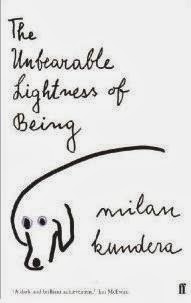I couldn't think of very much to write about
this (and could not finish it, and feel qualified to write anything), so I
initially turned to the internet, to find John Banville's 2004 comments on his re-read
of the novel in the Guardian, where he notes that he could not remember
very much from his first reading:
Why had so little remained for me? Is it the
result of failing memory, or is there indeed an essential weightlessness to the
book? The Unbearable Lightness of Being had a remarkable success when it was
published in English in 1984 (this autumn will see an anniversary edition from
Faber). Here was an avowedly "postmodern" novel in which the author
withheld so many of the things we expect from a work of fiction, such as rounded
characters - "It would be senseless for the author to try to convince the
reader that his characters once actually lived" - a tangible milieu, a
well-paced plot, and in which there are extended passages of straightforward
philosophical and political speculation, yet it became a worldwide bestseller,
loved by the critics and the public alike… What is remarkable, however, is
that a work so firmly rooted in its time has not dated. The world, and
particularly that part of the world we used to call, with fine carelessness,
eastern Europe, has changed profoundly since 1984, but Kundera's novel seems as
relevant now as it did when it was first published. Relevance, however, is
nothing compared with that sense of felt life which the truly great novelists
communicate. And lightness, in art, more often seems like slightness.
This was an interesting reflection, because my
initial response to the novel had been to assume that I found it nearly
unreadable because it had dated so badly; that its suggestion that its
characters are mere literary sketches had been avant-garde and postmodern at
the time, for example, but now appears trite and cliched. Reviewing the novel in 1984, the date of its
publication, in The London Review of Books, John Bayley praised it to
the skies but suggested, still, that, 'Whether it will last, whether one
will want to read it again, are more difficult questions to answer.' Andrew Williams named it a 'Book of a
Lifetime' in the Independent in 2009, and so I turned to his article to try and
understand what others had seen in the book. In accordance with my first
theory, he ties the experience of reading the novel in 1984 to his love for it,
remembering his passion for Kundera's novels as a university student. However,
unlike Banville, he seems to suggest that it does hold up on a re-reading,
although it's unclear whether or not he actually re-read it to write the
article. He praises the novel for 'the skill with which Kundera opens up that
gap between perception and reality' in his depiction of the mutual incomprehension
between Tereza and Tomas, and concludes by saying, 'This is a shamelessly
clever book – at times a little cold – but exhilaratingly subversive and
funny.'
My response would be: at times? It seemed to
me that Kundera was uninterested in writing a novel as we traditionally
understand it at all, and that Banville has hit the nail on the head when he
suggests that Kundera fails to convey the 'felt life' that is the
stock-in-trade of the novelist. But, of course, 'fails' is the wrong word to
use, because Kundera never attempted to create a living world in the
pages of this novel. It seems to me that there's often too little said, by both
professional reviewers and bloggers, about judging a novel by what you wanted
it to be, rather than what it is, or what the author was trying to
achieve. On that basis, it would be ridiculous to criticise Kundera for the
fact that his characters seem flat and contrived, because that was exactly the
point he was trying to make. However, it must be obvious from the fact that
I've created this post from a patchwork of other people's reviews that I have
very little else to say about this book. When one doesn't agree with a writer
about what a 'novel' is and what it should aim to do, then it's clear one isn't
going to get very far. It's less clear, however, how we can reach such an
agreement: but I wish reviewers spoke more often about the fact that often
we're using sets of standards that just don't match up.
 Having made a New Year's resolution to post on this blog every week this year, I'm amazed that I've pretty much done it as we reach the end of 2013 (with some extra posts to make up for missed Fridays!) Bring on December…
Having made a New Year's resolution to post on this blog every week this year, I'm amazed that I've pretty much done it as we reach the end of 2013 (with some extra posts to make up for missed Fridays!) Bring on December…





